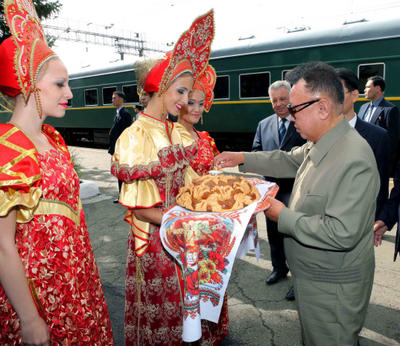North Korean debt — which stood at about 5 billion rubles by the time its servicing was stopped in 1990 when the bilateral payments were transferred to a hard currency base — now totals (with accrued interest) about US$11 billion. This debt was accumulated as a result of loans the Soviet Union granted the DPRK for industrial projects and military supplies, as well as to finance the trade imbalance.
After the break-up of the USSR, North Koreans at first declined to recognise the debt, choosing to interpret it as a Soviet investment into ‘protecting the Eastern flank of the Socialist system’. Only in the course of the then Russian President Vladimir Putin’s first meeting with North Korean leader Kim Jong-il in 2000 was the problem acknowledged. Later negotiations resulted in Russia proposing much of the same terms as was the case with other former socialist countries, which were required to make minimal payments. Yet, the DPRK’s position was not to pay a penny in cash. Russian negotiators were not insistent either, realising that little to no money or meaningful resources could be gotten from the impoverished neighbour. Furthermore, the settlement of the debt would give the DPRK a formal right to ask for new credits (including the construction of a nuclear power plant in accordance with a still valid agreement from 1985). The political effect of such a solution was not taken into account by the Russian government.
The negotiations were given a new boost after Kim Jong-il and Russian President Dmitry Medvedev’s meeting in August 2011. It was a painfully slow process, but finally a solution was found. Likely, it has something to do with North Korea’s desire to establish an alternative to their increasing economic and political dependence on China, by making a welcome gesture to Russia. According to reports, 90 per cent of the debt is to be written off (this is more favourable terms than in was the case with some other debtor countries), while the remainder will be transferred to the Russian Vnesheconom bank account, at the North Korean Bank of Foreign Trade, to be used for projects that will promote the development of education, health care systems and the energy industry. It should be noted that although such projects would technically be considered Russian direct investment, North Korea will in fact play a decisive role in determining these projects and their sequence — while the actual financing would depend on availability of North Korean money in the bank.
While this is an important measure to remove the roadblock impeding Russia-North Korean economic relations, we should not expect any significant moves soon afterwards given the economic crisis in North Korea and the reluctance of Russian investors to venture into a country under international sanctions. Had this agreement been reached earlier while the Six Party Talks were underway, Russia could have received considerable diplomatic benefits by demonstrating through example how to successfully engage North Korea. Now it is only a part of the efforts by Moscow to normalise relations with Pyongyang and to have more leverage in Korean affairs in the wake of the break-up of the multilateral diplomatic process. The absence of the debt problem will of course make the financial arrangements for future projects, like gas pipeline construction, easier. But the fate of such projects now depends on Seoul’s position, not on Pyongyang’s credit rating.
Georgy Toloraya is the Director of Korean research programs at the Institute of Economy, Russian Academy of Science.
A version of this article was first published here by the Nautilus Institute.

